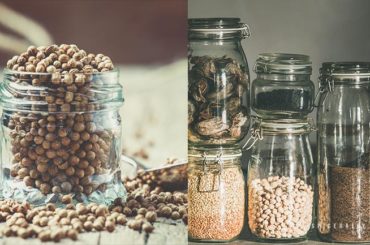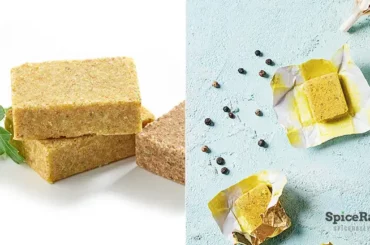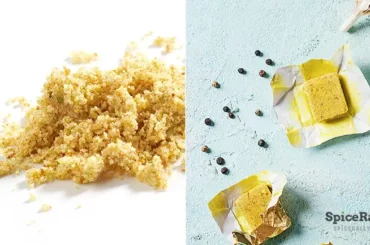Guy Ramsay Fieri, the well-known American restaurateur, author, and award-winning presenter; once in his life said that,
“Cooking is all about people. Food is maybe the only omnipresent thing that really has the capacity to bring everyone together. No matter what culture, everyplace around the world, people eat together.”
Truthfully, cooking and baking are art, and it is, in fact, a deal with infinite ingredients. Here, spices, herbs, and other flavorings play a significant role in contributing to the aroma, color, texture, and flavor of a particular dish.
Spices are basically plant-based elements that are included in food to enhance the flavor, aroma, color, and sometimes consistency. While seasonings also include spices and other ingredients like herbs and sometimes salt, sugar, vinegar, oils, sauces, or animal-based derivatives.
So, if you have been cooking all your life long and never thought about the difference between spice and seasoning, we are ready to unveil some exciting and meaningful facts through this article. Let’s get started!
Difference Between Spice And Seasoning
The foremost thing you should understand is that spices or seasonings never work alone. In fact, one or more of them get together and complement the taste of a particular recipe when added.

Salt itself alone is the world’s best and most known seasoning. And, black pepper is the best spice that it pairs with. So, that salt and pepper together become a seasoning, although black pepper alone is a spice.
Accordingly, the primary job role of spices and seasonings is to enhance the flavor, aroma, color, and texture of food.
What Is A Spice
A spice is technically a plant-based component that derives from fruit, seed, bark, root, or other plant material. They are predominantly employed to boost the flavor, aroma, or color of foods.
Spices are differentiated from herbs, which are the flowers, leaves, or stalks of plants utilized for flavoring or as a garnish.
In addition, every spice contains its own nutritional value and is sometimes used as medicine, religious practices, and in industries like cosmetics, esthetics, or perfume production. As a matter of fact, spices are typically considered vegan friendly since no animal is involved.
What Is Seasoning?
Seasonings mainly include spices and herbs and sometimes salt, sugar, vinegar, oils, sauces, or animal-based derivatives used to improve the flavor, fragrance, color, and texture of a particular food.
As mentioned on top, salt is the most common seasoning of all time, and it is included in most seasoning blends. Moreover, when salt combines with pepper, they make a lovely couple together as the best-known most uncomplicated seasoning- salt-pepper!
Seasonings come in two elemental forms as wet and dry seasonings. Wet seasonings mainly include spices, herbs, salt, oils, vinegar, and sauces like soy, sriracha, chili, etc.
On the other hand, dry seasonings consist of spices, dried herbs, and sometimes salt. In addition to this, freshly made seasonings even include lemon or lime zest and acids like lime juice, lemon juice, or vinegar.
However, many dry, wet or freshly made seasonings consist of spices most of the time. So, it is not wrong to say that spices are essential in almost all seasonings.
Although all the spices can be plant-based, all seasonings cannot be vegan-friendly. Since some of them contain several animal derivatives like fish sauce and prawn flakes, they could not be one hundred percent favorable for vegans, unlike spices.
Coming Back To The Difference Between Spice Vs Seasoning…
As clearly mentioned in the section above, spices and seasonings are two different things, although they have the same purpose when it comes to flavoring food.
In fact, spices are whole-plant derivatives that are added to any dish alone as an entirety, crushed or powdered, in order to enhance the flavor, aroma, and color. At the same time, seasonings are combinations that include spices, herbs, and other ingredients used for the same purpose as spices.
To bring you another interesting fact, although spices can be called seasonings, seasonings themselves cannot be known as spices. And, while spices provide their own flavor, aroma, and color to a particular dish, seasoning can improve the taste of your plate with its blend of flavors.
Are Seasonings And Spice Blends The Same Or Are They Different?
Such a slippery question this is! Well, to repeat the same story, here again, spice blends can be known as seasonings. But, if a particular seasoning contains something more than spices, we do not usually call it a spice blend.
However, world-famous spice blends like Garam Masala, Curry Powder, Pumpkin Pie Spice Blend, and Tikka Masala are made entirely with spices. They do not authentically contain any other ingredient-not even herbs or salt. But, it does not imply that you cannot add any other dry component to these blends. And, if in case you add any of them, it is a different story that they would instantly pivot for a seasoning!
Thus, the idea of spice blends and seasonings is slightly nuanced since we cannot call them the same but can still say they are equal.
20 Essential Spices That You Should Have In Your Kitchen
Since we are talking about spices and seasonings, we thought you might be interested in knowing about twenty spices out of the many that you should keep in your kitchen. Eventfully, you can use many of these in numerous seasonings too.
So, the essential spices that you should have at home are:
- Cinnamon
- Cardamoms
- Cloves
- Black pepper
- Turmeric
- Cayenne Pepper
- Paprika
- Nutmeg
- Ginger
- Garlic
- Allspice
- Fennel Seeds
- Cumin
- Coriander
- Star Anise
- Chilli Powder
- Onion Powder
- Garlic Powder
- Fenugreek
- Vanilla
Did you know that a few among these 20 essential spices are used to make yellow mustard? Click here, and we are ready to unveil a lot of information.
Popular Spice Blends And Seasonings From Around The World
Spices and herbs, collectively blends or seasonings, are an integral part of cooking in almost all countries in the world.
For this reason, they tend to come up with their own spice blends or seasonings that make signature dishes that have eventually gone overboard.
So let us have a quick dart at some popular seasonings, and spice blends picked from around the world.
- Chinese Five Spice
- Herbes de Provence
- Garam Masala
- Chaat masala
- Curry Powder
- Tikka Masala
- Pumpkin Pie Spice
- Italian Seasoning
- Thai 7 Seasoning
- Baharat
- Cajun Seasoning
- Creole Seasoning
- Lebanese 7 Spices
- Zaatar
- Harissa
- Fajita
- Old bay
- Shichimi Togarashi
- Bouquet garni
- Caribbean Green Seasoning
- BBQ Wet Rub
- Lemon Pepper Seasoning
Rounding Off With The Flavors…
What do you expect from a particular food other than punching hunger on the face? We believe that most of you would say- the ultimate expectancy of the food we eat is tastiness, visually appealing nature, and salubriousness.
Well, thankfully, spices or seasonings, whatever you use in your food, have the capacity to give an extra kick of flavor while adding the goodness of all the spices and herbs.
But, a little thing that you should be watchful of when using seasonings is the amount of salt and sugar used. Unlike spices alone, seasonings that contain too much salt or sugar can have adverse effects on your health. Thus, moderate use of such flavorings will always be a good choice.
So, before concluding with this article, we hope that you got enlightened enough with the differences between spice vs seasoning. And we believe that you got answers to the questions you long had in your mind.



